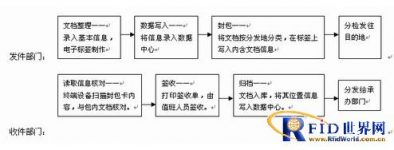
RFID document management solution
[ad_1]
1. Project background:
In recent years, great progress has been made in digitization and networking, and e-government has continued to develop. Document drafting and encrypted transmission can be achieved through computers and computer networks, which greatly improves work efficiency and brings people’s lives and work. A lot of convenience. However, paper documents are still inseparable from the reading of official documents, document inquiry, borrowing and returning, and packaging and distribution, so that the information on both ends of the computer network is landed. From the actual situation, paper documents cannot be replaced in a considerable historical period. How to use electronic technology to overcome the cumbersome work of paper document management and plug possible loopholes is an urgent problem in document management.
At present, RFID radio frequency identification technology is becoming more and more mature and is being widely used in various fields of society. It has increasingly demonstrated the remarkable effect of this high-tech. This provides us with a good opportunity to gradually replace manual management of documents with RFID radio frequency identification technology. .
2. Schematic diagram of system flow:

3. File management system diagram

The document management system consists of six parts:
1. Data management center; 2. Label distribution system; 3. Document circulation system; 4. Document borrowing and reading system; 5. Statistical inquiry system; 6. System management.
Fourth, the advantages of RFID technology in file management
1. Fast and accurate positioning: The geographic distribution map of the entire archive room is stored on the mobile inspection equipment, and the geographic positioning instructions will be given to the searched files to achieve rapid search and archiving operations.
2. Easy inventory: useRFIDChecking equipment can quickly complete file inventory, error checking, and shelves. It can greatly reduce the workload of librarians while improving the efficiency of file management and reducing the error rate when borrowing and archiving.
3. Accurate record of file information: the file handler, borrower, lending, filing time, etc. are all automatically registered by the system to prevent manual errors while ensuring the accuracy of the original data of the file management information system, and provide the status of the file Real-time query and report printing.
4. Batch file lending, archive registration management: file management is a very complicated task, with few file management personnel and many people looking for files. The application of RFID technology to realize modernization and automation of file management, increase work efficiency and reduce file administrators Intensity of labor, help librarians to realize automated batch file lending, filing and registration work
5. File RFID tag storage information can be changed freely: The electronic tag has a large access data capacity, and the stored information can be changed freely, which provides convenience for information management such as file attributes.
6. Security: The file management personnel must pass the identity verification to log in to the RFID file management system before they can lend and archive the files. For illegal take-out of the files, the system will give an alarm. Label information can also be encrypted.
[ad_2]


